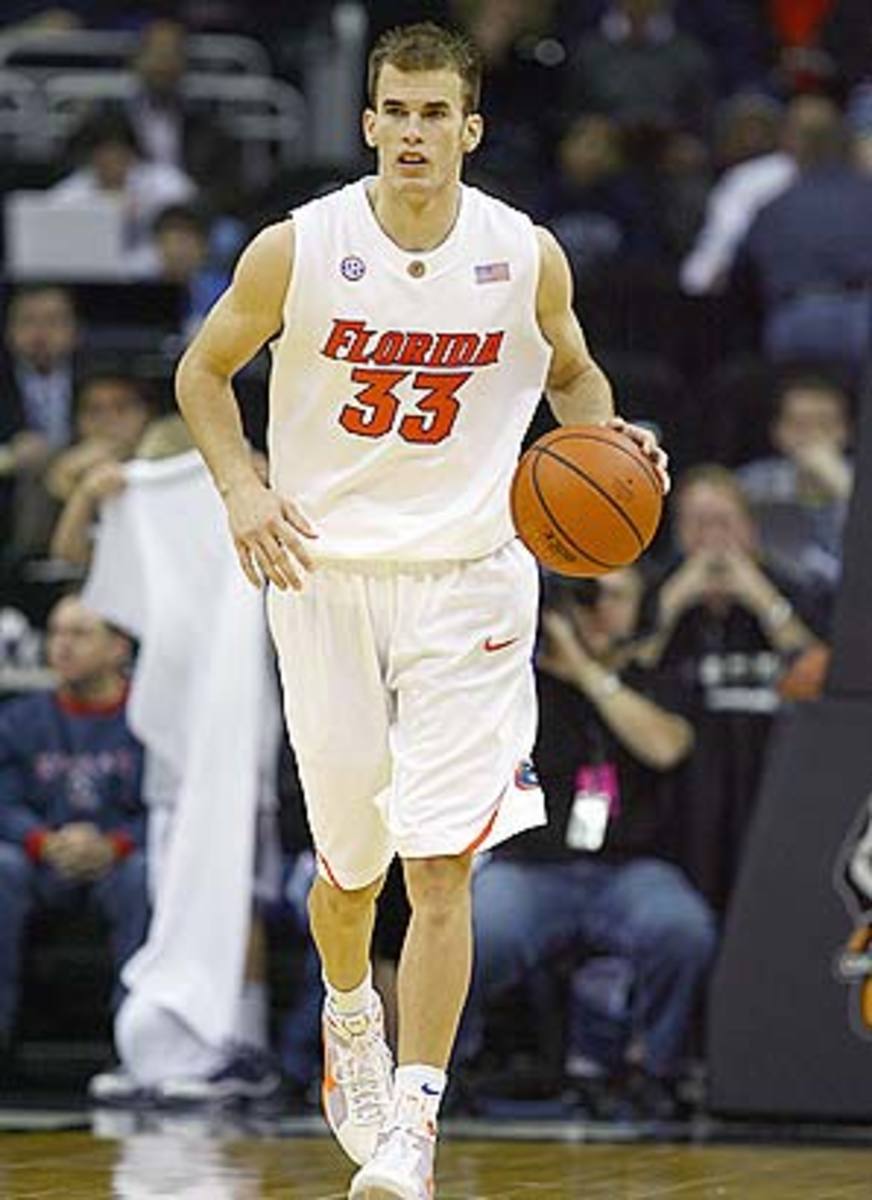European-league stigma fading fast for potential future NBAers
"Did you come here just to see Koufos?" I asked -- Koufos being Kosta Koufos, the Greek-sounding center from Canton, Ohio, who was headed for Ohio State.
"And Calathes!" the writer said, referring to Florida-bound guard Nick Calathes. "He has Greek relatives. People are wondering if he might play for the national team."
Calathes' connection to the Hellas seemed tenuous then; whereas Koufos' mother is Greek, and he played for the Greek Under-20 team that summer, Calathes' closest Greek-born relative was a great-grandfather, and Nick didn't have dual citizenship. But the ties tightened from there: The Hellenic Basketball Association began dialogue with Calathes' family that same spring, he eventually obtained his Greek passport in 2008, and played for its Under-21 team last summer.
When Calathes arrived back in Greece on Tuesday for the first time since that national-team stint, he was greeted by news cameras at the Athens airport. The finals of the Greek Cup had concluded on Monday night, and the winning club, Panathinaikos -- also the Euroleague champs -- was in the process of finalizing a $1.1 million-per-year contract with the former Florida guard, who had declared for the NBA draft after his sophomore season.
In Greece it was major news that Calathes was arriving. In the U.S. the important news is that there are NBA teams who want -- and fully expect -- Calathes to come back in 2010, and may be willing to use a late first-round pick on him this June in order to retain his rights. Additionally, he may have enhanced his draft stock by deferring teams' need to pay him until 2010, and keeping his buyout figure low. ("It will be a reasonable figure," a source close to the situation told SI.com this week.) Calathes is, in effect, taking a one-year study abroad, and getting paid for it.
Europe was once a punchline that hecklers used on prospects making ill-advised draft decisions ("Get your passport ready for Spain!"), and then a pasture for those who either couldn't make an NBA roster out of college or were released from an NBA team. Calathes is unique in that his European earning power is enhanced by his newly acquired dual citizenship -- there certainly aren't hordes of Greek-Americans in the NCAA ready to follow him to Athens -- but what he's done, in a larger sense, is further the destigmatization of European basketball in the minds of American-born players. No longer is the Old Continent just a place ballers go to disappear.
Consider the international developments involving Americans in the past year alone: In July 2008, Arizona recruit Brandon Jennings, who was having difficulty being admitted to college, opted to sign with Pallacanestro Virtus Roma in Italy instead, as part of a move orchestrated by former sneaker-world kingpin Sonny Vaccaro. The same month, Atlanta Hawks forward Josh Childress turned down a restricted free-agent deal in the NBA to take a record three-year, $32.5 million deal with Olympiakos. In April 2009, Louisville commitment Jeremy Tyler, one of the top-ranked players in the class of 2010, announced he'd be skipping his senior year of high school to play in Europe -- a move also arranged by Vaccaro.
Calathes' deal with Panathinaikos leaked in late May, just before Clemson sophomore Terrence Oglesby, the starting shooting guard on preseason top-25 team next season, also opted to take advantage of his dual citizenship (his mother is Norwegian) and leave school early to play professionally in Italy or Spain.
In three years, it's likely that Childress, Jennings, Calathes and Tyler will all be on NBA rosters, as evidence that various European routes can be taken without derailing an NBA career. Childress hasn't excelled for Olympiakos, but he still has a spot in the NBA should he want to return stateside. It's unclear whether Europe enhanced Jennings' development -- he played limited minutes in Rome, some not even at point guard -- but the fact that he's probably going to be a top-10 pick later this month is a decent endorsement of the decision. If Calathes, who, as a source in his camp explained, "had plenty of options, unlike Jennings did," completes the NCAA-Greece-NBA path, it'll only give further credence to studying abroad.
In the case of Oglesby, who had starred on the Norweigan U-21 team but wasn't going to be drafted, his decision was much less shocking than it would have been earlier in the decade. Imagine if Lee Humphrey, a player whom Oglesby was often compared to, had a European family connection and opted for Italy after Florida's 2006 national-title run. The reaction would have been outright laughter. Now when Oglesby's father, Tony, explained some of the reasoning to us -- "Terrence is fanatical about working out, and he can do it 5, 6 or 7 hours a day there with a team," he said, "whereas in the NCAA, coaches can't even be in the gym during a summer workout" -- it seemed logical.
Elite Europeans aren't exactly flocking to train in our college system. For the scores of them who've been drafted in the first round in this decade -- 37 in all -- just one, Lithuanian Linas Kleiza (now with the Denver Nuggets), spent time in the NCAA. While the stigma against Euros who play college ball is still strong, the stigma against Americans making pit-stops in Europe is fading fast -- and it'll only continue to do so while the NBA enforces its exploitative age-limit for draft prospects and drives more high-profile players abroad.
Just this week, a message-board rumor surfaced that Kentucky's biggest recruit, point guard John Wall, might ship off to Greece instead of Lexington due to eligibility issues. This was false; sources tell SI.com that Wall is expected to qualify academically and play for the Wildcats. The Kentucky fans who momentarily worried about it can be forgiven, though. The rumor may have been bogus, but the Euro option has become legit.





